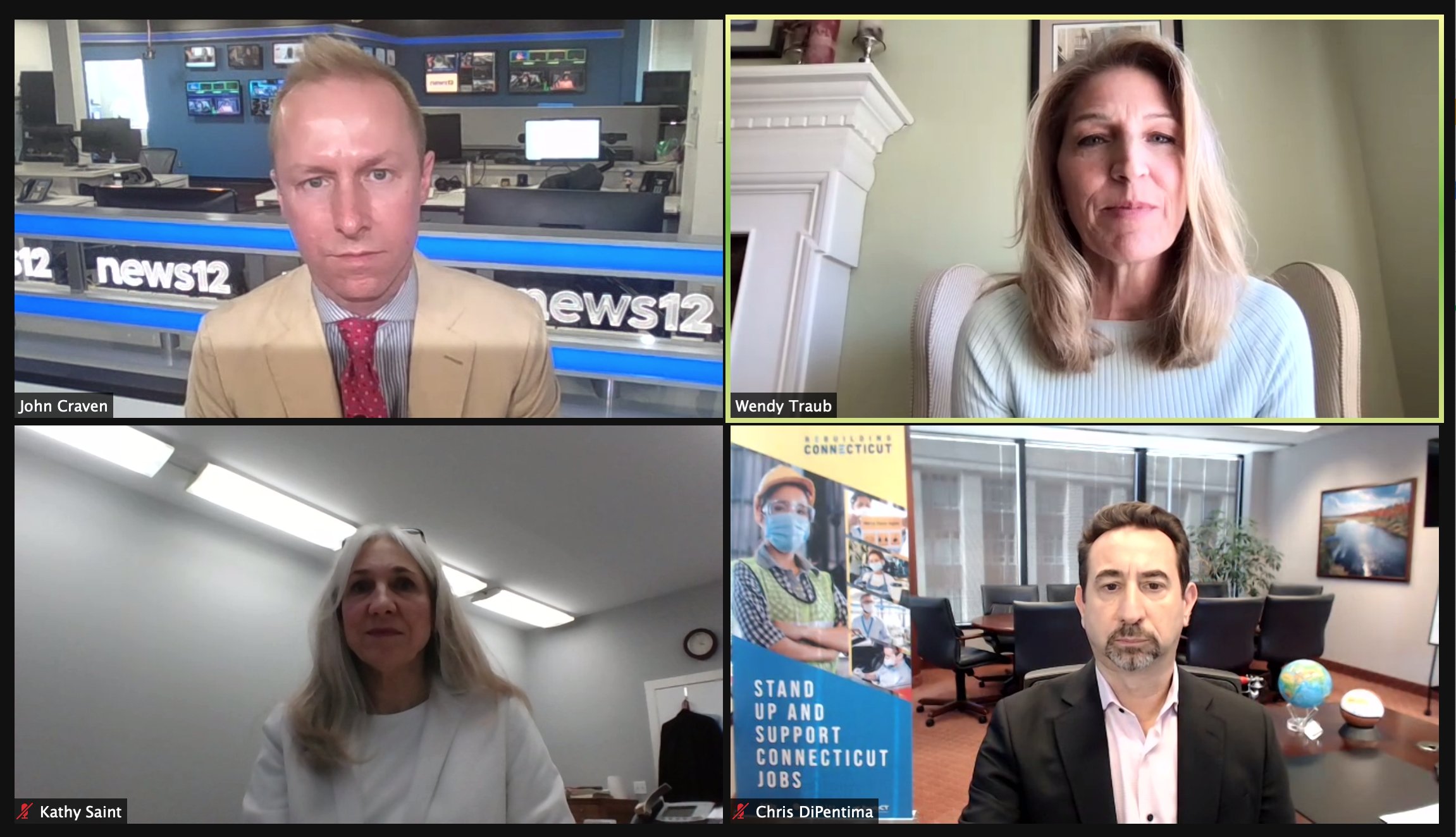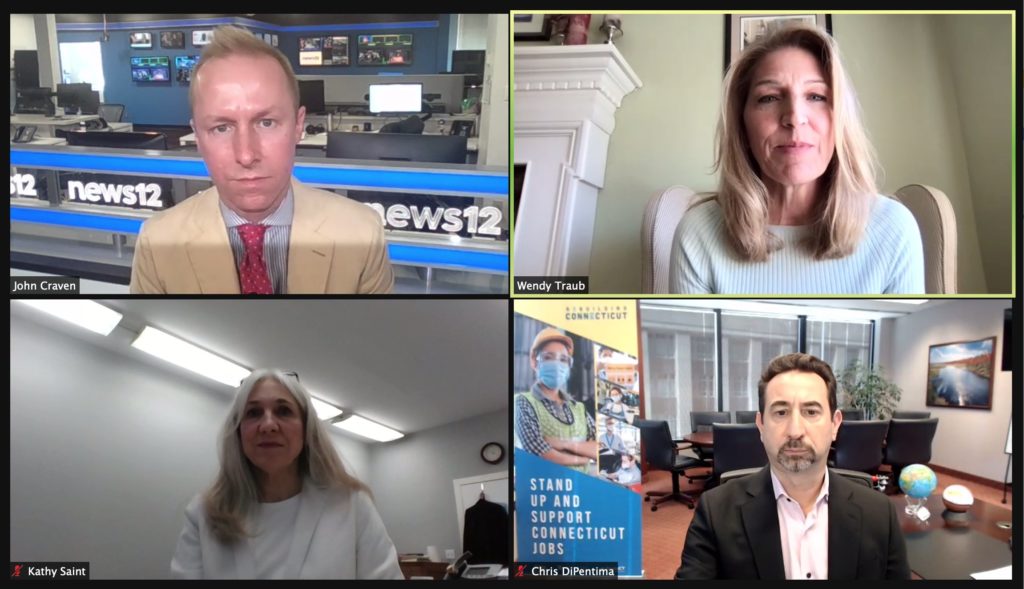Unemployment Debt Crisis Threatens Jobs, Economic Recovery

A coalition of small business groups warned this week that the state’s unemployment debt crisis threatens jobs and Connecticut’s economic recovery.
Connecticut has borrowed $700 million from the federal government to pay pandemic-driven unemployment compensation claims, with total borrowing expected to exceed $1 billion.

Employers are on the hook for paying off those loans, just as they were following the 2008-2010 recession when the state also borrowed $1 billion after the Unemployment Compensation Trust Fund became insolvent.
At a press conference April 7, CBIA, NFIB Connecticut, the Connecticut Restaurant Association, the Connecticut Food Association, and the Greater New Haven Chamber of Commerce urged the Lamont administration and the legislature to move quickly to address the issue.
They were joined by three small business leaders—Wendy Traub, chief financial officer of Torrington-based Hemlock Directional Boring; Kathy Saint, president and CEO of Schwerdtle, Inc. in Bridgeport; and Max Restaurant Group partner Scott Smith.
House Republican Leader Vincent Candelora (R-North Branford) and state Rep. Kerry Wood (D-Rocky Hill), who co-chairs the legislature’s Insurance and Real Estate Committee and the Moderate Democratic Blue Dog Caucus, also spoke at the press conference.
Federal Relief Funds
CBIA president and CEO Chris DiPentima urged the administration and legislature to follow the example of 24 states that are using federal coronavirus relief funds to either help meet unemployment benefit obligations or pay down loans.
“This is a looming crisis and absent federal relief dollars, businesses in Connecticut will be paying down this debt for many years to come—threatening jobs recovery and the state’s economic recovery,” he said.
“We cannot afford what happened after the 2008-2010 recession, with Connecticut employers paying four times the unemployment taxes of those in neighboring states, a financial strain that prolonged the economic downturn and hurt job recovery and economic growth.”
Connecticut has recovered just 58% of the 292,400 jobs lost last March and April to COVID-related shutdowns and restrictions. The state’s unemployment rate is 8.5%, New England’s highest and well above the U.S. rate of 6.2%.
Twenty-four states are using relief funds to either help meet unemployment benefit obligations or pay down federal loans.
Traub said her family owned company shut down for eight months due to COVID-19 restrictions, leveraging the federal Payroll Protection Program to retain employees.
“With the PPP money running out and diminished and lagging revenue, every dollar is going to matter to us for at least a few years,” she said.
Saint said her company paid more than $40,000 in special assessments to the state’s unemployment trust after the last recession—money that was desperately needed elsewhere.
“That’s a machine we needed. That’s another person,” she said said. “Every single penny counted, and we were doing without in a lot of ways.”
‘Devastating Impact’
Andrew Markowski, NFIB state director in Connecticut, warned that another round of tax hikes and special assessments will have a devastating impact on the state’s struggling small businesses.
“The COVID-19 pandemic hit small businesses harder than it did large ones, and while a recovery here in Connecticut has slowly begun, it is uneven and fragile,” Markowski said.
“Without a significant infusion of money, small business owners will be faced with devastating tax hikes, special assessments, and surcharges like they were post-2009.
“By committing federal money to our state’s unemployment trust fund, lawmakers can avoid placing higher costs on job creators at a time when they can least afford it.”
Connecticut Restaurant Association executive director Scott Dolch said Connecticut was one of the last states to pay off its federal loans after the 2008-2010 recession, with employers burdened by six years of higher taxes and special assessments.
“Connecticut’s restaurant industry was among the earliest and most directly impacted sectors of our economy when COVID hit, and what restaurants need now more than ever is stability and predictability,” he said.
“Our industry is made up almost entirely of small businesses, and their owners remember what happened after the Great Recession, when they had to foot the bill for borrowing related to this fund.
“That can’t happen again—Connecticut needs to address this problem by using available federal dollars, not asking any more of struggling businesses like ours.”
Max Restaurant Group’s Smith said “it would be the absolute worst time to allow a major issue such as the unemployment trust to go unresolved.”
Legislative Support
Candelora said he hoped the news conference would spotlight the issue and generate a greater degree of bipartisan momentum for using federal funds, adding that the legislature must support the state’s job creators—particularly small businesses.
“While a growing sense of hopefulness driven by the vaccine signals a return to normalcy, members of the General Assembly can’t lose sight of the fact that the pandemic has pushed many Connecticut businesses to the brink—and, unfortunately, some beyond it,” he said.
“The legislature must, of course, do all it can to support our state’s job creators in their recovery. Focusing on the unemployment trust fund seems a logical place to start not just because there’s some bipartisan interest, but because history tells us the years-long burden the business community would face in paying back the state’s accumulated unemployment debt could slow our economic recovery to an uncomfortable crawl.
“I urge the governor and all of my colleagues in the legislature to turn their attention to this issue today to ease some of the pressure businesses will face in the future.”
Wood said the state must prioritize job recovery and economic growth and adopt the practices of other states that are utilizing federal COVID relief funds to relieve the burden on businesses.
“Our pandemic recovery should be about investing in our economy and doing everything possible to encourage growth,” she said.
“This includes using American Rescue Plan Act dollars to help our state’s businesses with unemployment debt.”
Governor ‘Noncommittal’
Gov. Ned Lamont, who in December said he opposed the idea, was noncommittal when asked by reporters this week about using federal relief funds to protect Connecticut small business and the state’s job and economic recovery.
“I’d think about it,” he said. “Working with our federal delegation, it’d be great to turn a lot of the loans to all 50 states into a grant. You have 50 governments, all needing to borrow because the unemployment rate kicked up so badly; all of us will have to raise the unemployment trust tax rate to pay off that surcharge.
“If it was turned into a grant it’d be incredibly beneficial for everyone. Failing that, we’ll look at some of our other funding and see if we should put some of that into the trust fund to mitigate the possibility of raising those rates over time to make up for the shortfall.”
U.S. Rep. Joe Courtney (D-CT 2) told the CT NewsJunkie that Congress intended that federal relief funds be flexible, saying there was an argument to be made to use those dollars to pay down state unemployment debt.
“To the extent that COVID caused unemployment to go up, which it obviously did … that may be a permitted use,” he said.
For more information, contact CBIA’s Eric Gjede (860.480.1784) | @egjede.
RELATED
EXPLORE BY CATEGORY
Stay Connected with CBIA News Digests
The latest news and information delivered directly to your inbox.


